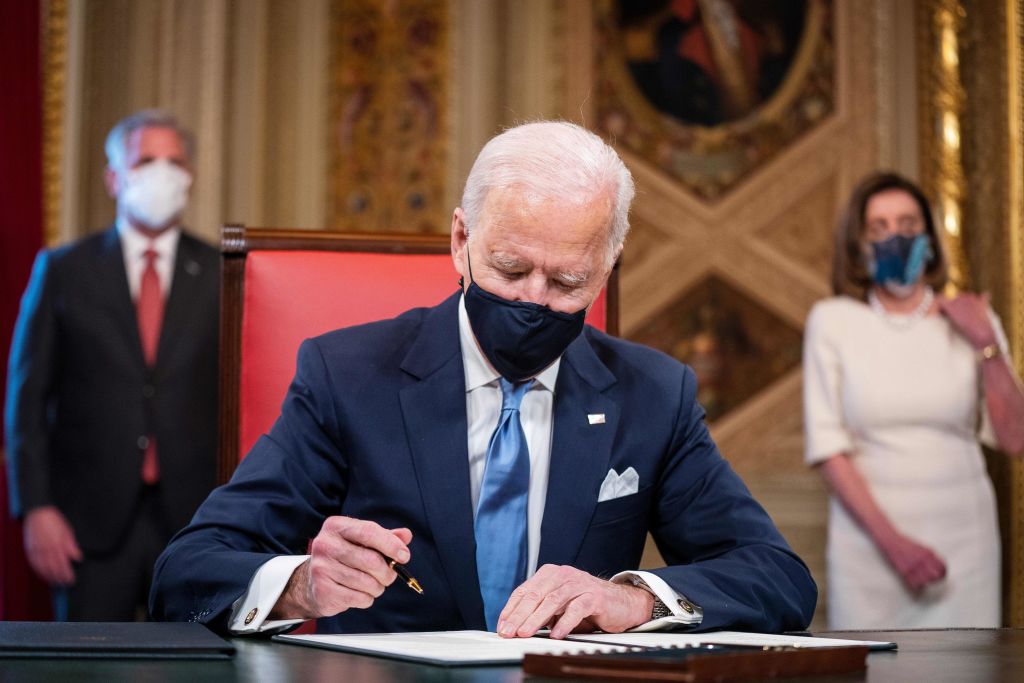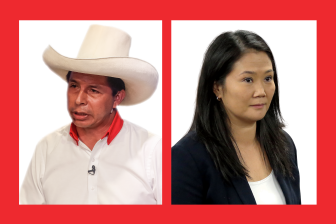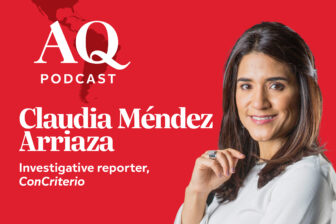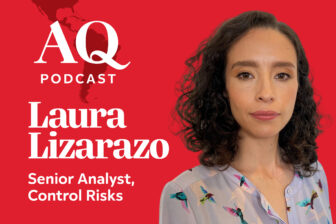WASHINGTON – The inauguration of Joe Biden as the 46th President of the United States had a palliative effect on those of us who care about U.S. democracy. In the aftermath of the January 6 insurrection in Washington – a failed attempt to overturn an election by force – and the brutal scene of demonstrators invading the Capitol and threatening elected leaders, it was comforting to witness the president-elect take the oath of office.
My wife Guisela and I watched the inauguration on television from our home in Arlington, Virginia, only a few minutes across the Potomac River from the Capitol. We could not attend the inauguration in person because of the extraordinary security measures put in place in the aftermath of the failed insurrection. The fencing, concrete barriers, and National Guard troops that secured Washington served as a reminder that the threat to our democracy had been beaten back, but not defeated.
As the colors were presented during the ceremony, and uniformed members of our armed forces carried the U.S. flag across the portico that two weeks before had seen demonstrators wave Confederate and white supremacist flags, and build a gallows, Guisela put her hands to her face and began to weep. Her tears continued as Lady Gaga sang these words from our National Anthem:
And the rocket’s red glare, the bombs bursting in air
Gave proof through the night that our flag was still there;
Oh, say does that star-spangled banner yet wave
O’er the land of the free and the home of the brave?
My wife is a Guatemalan by birth, and an American by choice. She became a U.S. citizen after we married, and served with me across 32 years of my diplomatic career, representing her newfound country across the globe. She also gave birth and raised two U.S. citizen sons, one of whom became an Army officer who served in Afghanistan. She knows what it means to be an American, and she knows the power and attraction of democracy to those who live without it.
With the U.S. flag snapping in the wind, and Lady Gaga seemingly singing not about the British assault on Fort McHenry during the War of 1812, but instead about the assault on our Capitol two weeks before, to weep was the right response. Our flag was still there, and so was U.S. democracy.
But the question still on many minds is: How are we to keep it?
A day of anguish throughout the Americas
For my friends and colleagues throughout Latin America and the Caribbean, January 6 was a day of surprise, worry, and anguish. The violence unleashed on the Capitol was a combination of public fury and security failure that many had seen or experienced in their own countries. But what was especially concerning to those who called me was the role of President Donald Trump. They watched his rally with disbelief, and understood his call for his followers to march on the Congress to be what it was: A demand that they take action to stop the counting of electoral votes and prevent the election of Joe Biden as the next president of the United States.
Too many of those who reached out to me had seen their own presidents turn on legislatures and launch auto-golpes, or “self-coups,” designed to consolidate executive power as the dominant and determining branch of government. Or they had witnessed institutional warfare that had paralyzed governments and opened up wide political chasms in their countries.
That something similar could happen in the United States generated deep anxiety and worry. Could it be that our democracies were facing an array of challenges that would overwhelm our institutions and constitutional orders? If this could happen in the United States, could it be stopped anywhere?
As anxious as the initial response was to the assault on the Capitol, my friends saw in the determined defense of the Capitol and the Vice President, Senators, and Representatives by Capitol and Metropolitan Police a heroic and successful stand to protect our democratic institutions. But they knew that in those moments the well-being of our institutions depended on the courage of a small group of police officers to confront or misdirect the demonstrators. The ability of Senate and House leadership to rally their members, and return to their chambers and a joint session to continue the vote count that same day, allowed everyone to catch their breaths, and to understand that our institutions had bent but not broken. The solace this offered, however, was undermined by a vote count, especially in the House, that clearly showed the sentiments that motivated the insurrection to be widely spread and still resonating in our body politic.
One friend captured the sentiments of many when he asked me, “What is to be done? How is American democracy to be restored?”
For those of us who grew up singing the National Anthem, we often forget that the lyrics were written by Francis Scott Key when he was a prisoner aboard a British war ship in Baltimore harbor. Key watched the bombardment of Fort McHenry, and his poem is not an assertion of American resilience, but a series of urgent questions. In the aftermath of the bombardment, he wanted to know: Is the flag still flying?
President Biden, in his inaugural address, called on Americans to leave behind our “uncivil war,” and to unite around the effort to confront the many challenges facing our nation. To some, the President’s words seemed incongruent with the divisions highlighted in the insurrection. To others, they seemed naïve, as if deeply rooted complaints and social hostility could be wished away by a rhetorical call to togetherness that would surely run aground on the reef of partisanship.
I understand the President’s words differently. The union he calls for is not one formed by agreement and common understandings; instead, it is a union shaped by common purpose formed out of engagement, dialogue, and cooperation. It is a political union, not an ideological union. But it is also a union shaped by sentiments deeply rooted in President Biden’s personal history: Hope, determination, and confidence in the American people.
The President’s inaugural rhetoric was an important and necessary step towards “a more perfect union.” It was a response to the rhetoric of former President Trump, who spoke in terms of resentment and grievance, and who aggravated the fears and uncertainties of many Americans.
American democracy does not sublimate political energy; our democracy finds a way to express it. But how it is expressed is important.
United by democracy
Our history is replete with instances of crisis and confrontation. It is full of institutional and social flux, and it has handed us countless examples of selfless devotion and utter, craven self-interest. But when our better angels prevail, this human drama provokes not a sense of loss, fear, and confusion, but instead potentiality and expectation. In other words, hope.
And this is where U.S. democracy becomes meaningful for other peoples and nations. At its core, our democracy is more than its formalisms. It is more than a peaceful means to transfer power. It is more than constitutional order. It is more than a series of checks and balances that protect the individual and prevent tyranny. It is a system of government that is rooted in the possibility of individual self-development. It is one that recognizes that liberty requires opportunity and resources if it is to allow each citizen to achieve his or her individual destiny. A government, to be considered democratic, to allow for the free functioning of the individual, what our Founding Fathers called “the pursuit of happiness,” must provide each individual the means to be a complete person. And this completeness lies not only within the individual, but also how that individual understands himself or herself within our nation, and how he or she relates to fellow citizens. In other words, in democracy, liberty requires equality and fraternity.
Within this context, U.S. democracy moves beyond our national characteristics. It touches on the great problems of human nature and destiny, and it reminds us that we are moral agents in this world who understand the multiplicity of our interests in ethical terms.
As Guisela and I watched our new president and listened to his speech, it struck me that 20 years ago the United States had joined with its New World counterparts to make a unique and inspiring commitment to democracy. First, at the Summit of the Americas in Quebec City in April of 2001, then-President George W. Bush and other hemispheric leaders had asserted that only democracies could participate in the summit process. A few months later, on September 11 in Lima, Peru, the members of the Organization of American States (OAS) had agreed to the Inter-American Democratic Charter. This remarkable document committed the OAS to democracy as the only legitimate form of government in our Hemisphere.
For the first time, a regional organization had declared that democracy was a “right” inherent to all “the peoples of the Americas,” and that “governments have an obligation to promote and defend it.” The charter also asserted that democracy “is essential to the social, political, and economic development of the peoples of the Americas.” This remarkable convergence of democratic experience and understanding, in our hemisphere, highlighted that our goal was not just the creation and support of democratic governments. It was also a commitment to use democratic governance to create democratic societies. In this regard, our partners understood that our democracy had an important social content. As Walt Whitman, the poet laureate of democratic man, wrote, democracy must be lived in the open air and must have a human face.
These concepts would have been easily understood by early Americans, even with all the contradictions of American life. They would have been easily understood by Abraham Lincoln and Franklin Roosevelt. And, critically, they are understood by Joe Biden. In the aftermath of the political tumult of this past year and the heavy human and economic toll of the pandemic, the importance of this social content has been brought home to all Americans. What is remarkable is that here, in our hemisphere, we have created a web of democratic solidarity that should inspire us and allow us to understand our national project in larger terms.
If there is a democratic disconnect in the United States and its sister republics in the Americas today, it is a product of profound economic, social and technological change that has overrun the ability of our political institutions and parties to manage and respond to them. The political energy that courses through our societies has overflowed its institutional channels. In the democratic flood plains where we now find ourselves, there is fertile ground for the emergence of the populism that torments many countries, the United States included. But there is also fertile ground for the rebuilding and evolution of our institutions, political parties, and civil societies in ways that make them more representative and responsive to our citizens, and capable of facing the challenges that will present themselves as we venture deeper into the 21st century.
In other words, what we need is more democracy, and the open societies in which democracy resides and prospers.
Returning to the National Anthem, we can answer Francis Scott Key’s question as Lady Gaga did: Yes, the star-spangled banner yet waves. This gives us a place to stand and defend what is most valuable in our national life, and to link it to a larger democratic project that reflects the values and purpose of the remarkably varied, diverse, and dynamic societies that make up our Hemisphere.
Lady Gaga was followed to the podium by Jennifer Lopez, who sang a song by Woody Guthrie, one of our greatest folk musicians. That song, This Land is Your Land, describes Guthrie’s travels where he “roamed and rambled and I’ve followed my footsteps” all across the beauty that is America. But he reminds his listeners as he describes his travels that wherever he went he heard a voice that said:
This land is your land and this land is my land
From California to the New York island
From the redwood forest to the Gulf Stream waters
This land was made for you and me.
It is in the recognition of this common purpose, and common commitment, that our democracy will be saved.
—
Shannon was a U.S. diplomat for 35 years, ending his career as under-secretary of state and the highest-ranking career diplomat. He is currently a member of Americas Quarterly’s editorial board, the board of the Council of the Americas, and is senior international policy advisor at Arnold and Porter.







